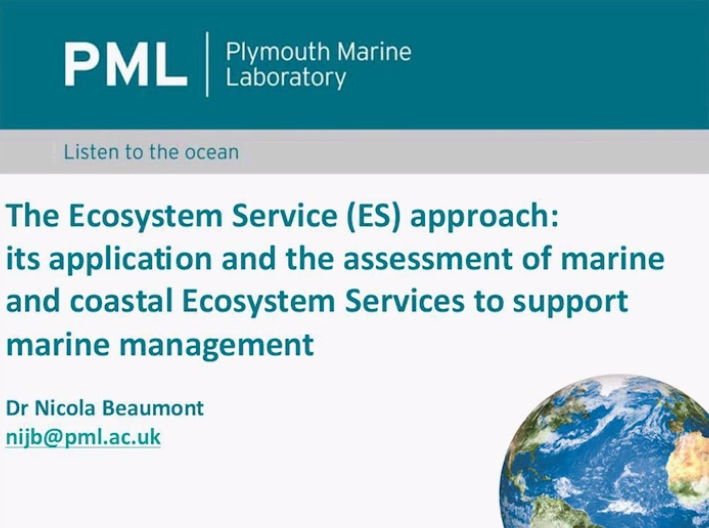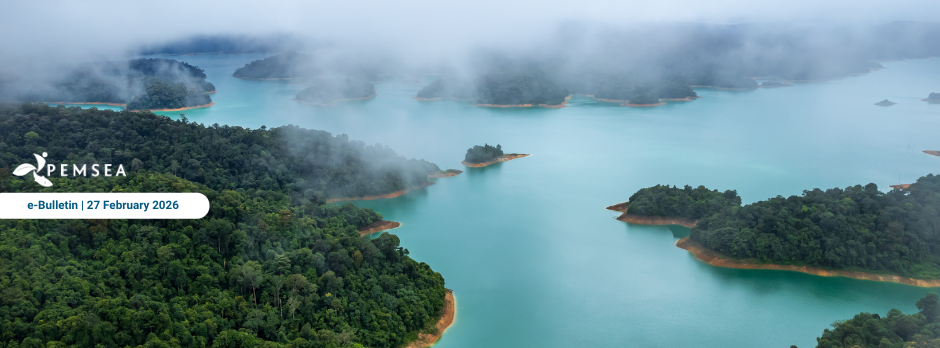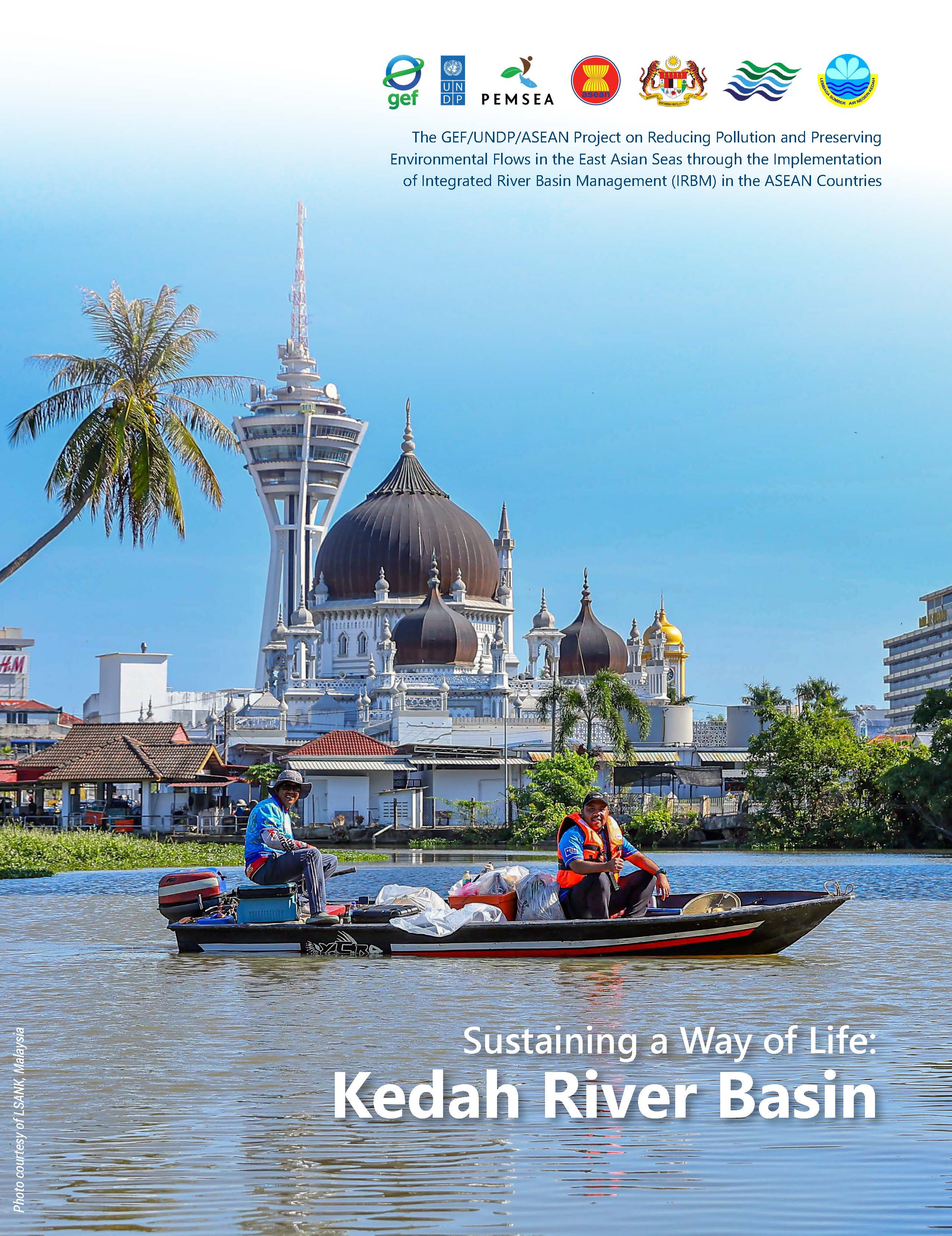
Breadcrumb
Webinar on the Ecosystem Services Approach
PUBLICATION DATE:
Tuesday, June 07, 2016
PUBLICATION TYPE:
Manuals, Guides and Webinars
STATUS:
Only Available Online
DESCRIPTION:
Watch this FREE webinar to hear from Dr. Nicola Beaumont on the valuation of marine and coastal ecosystem services. PEMSEA's webinar series, together with its partner, Plymouth Marine Laboratory (PML), aims to share knowledge about ecosystem services valuation and its application at the local level.
The term “Ecosystem Services” is increasingly used throughout the domains of both academia and management. However, it is easy to lose sight of both the meaning and purpose of this term. This webinar aims to clarify the cutting edge thinking on what Marine and Coastal Ecosystem Services are, and to provide the most recent examples of their application. To provide context the origins and evolution of the ecosystem service approach will be presented, from its early definition in the Millennium Ecosystem Assessment, through its re-classifications and conceptual developments (including TEEB, CICES and NEA), to conclude with an analytical overview of the most recent marine ecosystem services classifications. The benefits and barriers of applying the Ecosystem Service approach in a practical management context will then be examined, including a broad range of real world case study examples. In line with the current growth in research and policy demands a focus on the spatial mapping of ecosystem services, and their use in marine spatial planning will be provided. Both successes and failures in assessment and application will be explored, and from these future recommendations will be reviewed.
RELATED PUBLICATIONS
-
PEMSEA eBulletin - February 2026
Dear PEMSEA community,
Short month. Big moves. February saw PEMSEA turn vision into action, advancing major initiatives across the East Asian Seas.
In the Philippines, the Department of Environment and Natural Resources–Biodiversity Management Bureau, together with Conservation International and support from the Global Environment Facility, officially launched the PRICELESS Project. The five-year initiative aims to strengthen the conservation and sustainable management of the Philippine Rise Marine Resource Reserve through science-based governance, enhanced marine protection, and inclusive partnerships supporting long-term ecosystem resilience.
In Timor-Leste, implementation of the MOF/PEMSEA Marine Plastics ODA Project formally commenced through a national launching meeting led by the Ministry of Agriculture, Livestock, Fisheries and Forestry in partnership with the Ministry of Tourism and Environment and PEMSEA.
In Pampanga, Philippines, the GEF/UNDP/ASEAN Integrated River Basin Management (IRBM) Project convened partners to address watershed challenges and identify targetted strategies for the Pasac–Guagua Watershed.
This month, we also feature the the story of Kedah River Basin in Malaysia, where fishing guides, rice farmers, women food entrepreneurs, and government partners work together to sustain Sungai Kedah from forested headwaters to the rice plains below.
-
IRBM Stories - Sustaining a Way of Life: Kedah River Basin
In Kedah, Malaysia, fishing guides, rice farmers, women food entrepreneurs, river associations, and government partners are working together to sustain Sungai Kedah — the Kedah River — from its forested headwaters in Ulu Muda to the rice plains below. Along its course, communities depend on regulated flows for paddy cultivation, inland fisheries, river-based enterprise, and food traditions that have long shaped Kedah’s identity as the nation’s rice bowl.
Monsoon floods, sedimentation, and pollution place increasing pressure on the basin. Along the river, local groups practice catch-and-release fishing, organize clean-ups, and build enterprises rooted in its waters. At the same time, coordination among state and national agencies — through a Source-to-Sea approach that advances integrated river basin management and governance — is deepening shared responsibility across the basin.
Read more about the Kedah River Basin profile.
-
MOF/PEMSEA Marine Plastics ODA Project Interim Regional Steering Committee Meeting
The Regional Steering Committee (RSC) meeting is the highest decision making body of the Official Development Assistance (ODA) Project entitled “Reducing Marine Plastics in the East Asian Seas Region” comprised of the donor: the Government of Republic of Korea represented by the Ministry of Oceans and Fisheries (MOF), and the participating countries: the Philippines, represented by the Department of Natural Resources and Environment (DENR) and Timor-Leste, represented by the Ministry of Agriculture, Livestock, Fisheries and Forestry (MALFF) and the Ministry of Tourism and Environment (MTE). The Regional Project Management Unit (RPMU) of the PEMSEA Resource Facility (PRF) of Partnerships in Environmental Management for the Seas of East Asia (PEMSEA) serves as the Secretariat.
The RSC convenes every year to report the progress and approve work plan and budget for the following year’s project activities. The chairmanship is assumed by both participating countries on an alternating basis. This inaugural RSC meeting was organized in Manila, Philippines and chaired by the Government of the Philippines, represented by H.E. Undersecretary Jonas Leones of the DENR.
The Interim RSC Meeting was held on 12 December 2023 via Zoom.
-
MOF/PEMSEA Marine Plastics ODA Project Second Regional Steering Committee Meeting
The Regional Steering Committee (RSC) meeting is the main decision making body of the Official Development Assistance (ODA) Project entitled “Reducing Marine Plastics in the East Asian Seas Region” comprised of the donor: the Government of Republic of Korea represented by the Ministry of Oceans and Fisheries (MOF), and the participating countries: the Philippines, represented by the Department of Natural Resources and Environment (DENR) and Timor-Leste, represented by the Ministry of Agriculture, Livestock, Fisheries and Forestry (MALFF) in collaboration with the Ministry of Tourism and Environment (MTE) and Ministry of State Administration (MSA). The Regional Project Management Unit (RPMU) of the PEMSEA Resource Facility (PRF) of Partnerships in Environmental Management for the Seas of East Asia (PEMSEA) serves as the Secretariat to the RSC.
The RSC meets at least once a year to report on the progress of the project, sets its strategic directions and guidance and approves work plan and budget for the following year’s project activities. The inaugural RSC meeting in 2023 was chaired by the Government of the Philippines, represented by H.E. Undersecretary Jonas Leones of the DENR. This year, the 2nd RSC meeting was chaired by the Government of Timor-Leste, as represented by the Advisor to the Secretary of State for Fisheries, MALFF, Mr. Aleixo Leonito Amaral.
The 2nd RSC Meeting was held on 17 December 2024 via hybrid format at Radisson Park Inn, Quezon City and Zoom.
-
MOF/PEMSEA Marine Plastics ODA Project Intersessional Regional Steering Committee Meeting
The Intersessional Regional Steering Committee (RSC) Meeting of the MOF/PEMSEA ODA Project on Reducing Marine Plastics in the East Asian Seas Region was held on 17 September 2025 via Zoom, in line with the agreements made during the 2nd RSC Meeting in December 2024. The primary objective of this session was to review and endorse the detailed designs of pilot projects in the six Philippine project sites: Bulan, Calbayog, Daanbantayan, Dipolog, Puerto Princesa, and Tandag.
These pilot projects form part of Component 2 of the ODA Project, which focuses on demonstrating best practices and locally adapted solutions for marine plastics reduction. Designed to respond directly to site-specific challenges identified during the baseline assessments, the pilot projects aim to improve local plastics and waste management systems, enhance community engagement, and reduce the leakage of plastic waste into coastal and marine environments. The interventions are aligned with national and local priorities.
During the 2nd RSC meeting in 2024, the pilot project concepts for the Philippine sites were approved. Subsequently, the detailed designs of the pilot projects have been developed by the consulting firm, EECI, Inc., in close collaboration with local government units (LGUs) in 2025. These designs reflect the insights, technical inputs, feasibility, and on-ground realities gathered through extensive stakeholder consultations.
The Intersessional RSC meeting was an essential step to ensure that the proposed interventions are sound, feasible, and ready for implementation. The outcomes will not only guide the pilot project implementation but also reinforce the collective commitment of project partners to achieve measurable impacts in reducing marine plastics in the Philippines.
The meeting was organized in hybrid format: at the conference room of the office of Undersecretary Jonas R. Leones and through Zoom for the online participants.





